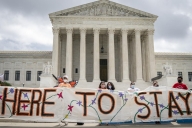Filter & Sort
Student Wellness Tip: Increasing Access to Affordable Food
Basic needs insecurity can threaten student persistence and completion. Colleges have implemented creative solutions to provide students with low- or no-cost food options.
Supporting Noncitizen Students in Higher Ed
President-elect Trump has threatened mass deportations. The Presidents’ Alliance on Higher Education and Immigration suggests how institutions can support students who may be immigrants or undocumented.
Academic Probation Gets a Rebrand
College students who earn a 2.0 GPA or below are often at risk of dismissal. Leaders are now reimagining how academic probation is communicated to students and ways to make the policy less punitive.
Success Program Launch: Wraparound Support for Former Foster Youth, Homeless Students
A new program at Carlow University in Pennsylvania provides targeted support and outreach to students with foster care experience or who have experienced homelessness.
Campus Engagement Tip: Using Student Feedback to Build a Campus App
Dalhousie University launched a new campuswide application to combine legacy systems and provide better data integration. University leaders share how student input drove the process.
Survey: Majority of College Students Believe Their Vote Didn’t Matter in the Election
A mid-November Student Voice survey found over half of college students felt their vote didn’t make much of a difference in the 2024 general election.
Report: Supporting Fraternity Members’ Mental Health
JED researchers investigated the benefits and risks of fraternity life with regard to students’ health and wellness, finding that the organizations can both help and hurt the campus community.
Personalizing and Increasing Access in Career Services
A new brief from the Association of Public and Land-grant Universities highlights promising practices in career readiness for college students, including tech integration and targeted outreach.
Pagination
Pagination
- 25
- /
- 123







